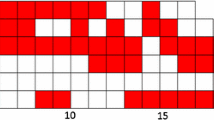Abstract
The multi-day spaced charging, hardly considered in current strides aiming at optimal electric vehicle charging, is the concern of this study, and thus, an extended time scale covering several days should be dealt with. This study firstly analyzed the routines and implementations of charging behaviors over the extended time scale and then quantified the range of charging start time of electric vehicles precisely, which turned out to be discontinuous, huge and complicated. Finally, the mathematical formulation of the optimal charging strategy over the extended time scale as well as its constraints was established. The proposed problem can be solved by MATLAB simulations, which was addressed in details. Moreover, numerous simulations were conducted and demonstrated that the proposed strategy can reach a better system load characteristics than the ordered charging on a daily basis with a good maneuverability.







Similar content being viewed by others
References
Shukla A, Verma K, Kumar R (2019) Multi-objective synergistic planning of EV fast-charging stations in the distribution system coupled with the transportation network. IET Gener Transm Distrib 13(15):3421–3432
Hajizadeh A, Kikhavani MR (2018) Coordination of bidirectional charging for plug-in electric vehicles in smart distribution systems. Electr Eng 100(2):1085–1096
Chen J, Huang X, Tian S et al (2019) Electric vehicle charging schedule considering user’s charging selection from economics. IET Gener Transm Distrib 13(15):3388–3396
Zhang P, Qian K, Zhou C et al (2012) A methodology for optimization of power systems demand due to electric vehicle charging load. IEEE Trans Power Syst 3:1–9
Moradijoz M, Parsa Moghaddam M, Haghifam MR et al (2013) A multi-objective optimization problem for allocating parking lots in a distribution network. Int J Electr Power Energy Syst 46:115–122
Ali A, Raisz D, Mahmoud K (2018) Optimal scheduling of electric vehicles considering uncertain RES generation using interval optimization. IEEE Trans Power Syst 100(3):1675–1687
Esmaili M, Rajabi M (2014) Optimal charging of plug-in electric vehicles observing power grid constraints. IET Gener Transm Distrib 4:583–590
Mohsenian-Rad H, Ghamkhari M (2015) Optimal charging of electric vehicles with uncertain departure times: a closed-form solution. IEEE Trans Smart Grid 6:940–942
de Hoog J, Alpcan T, Brazil M et al (2015) Optimal charging of electric vehicles taking distribution network constraints into account. IEEE IEEE Trans Smart Grid 1:365–375
Staats PT, Grady WM, Arapostathis A et al (1997) A procedure for derating a substation transformer in the presence of widespread electric vehicle battery charging. IEEE Trans Power Deliv 4:1562–1568
Vyas A, Santini D (2008) Use of national surveys for estimating ‘full’ PHEV potential for oil use reduction [EB/OL]. http://www.transportation.anl.gov/pdfs/HV/525.pdf. Accessed 21–24 July 2008
Xu H, Miao S, Zhang C, Shi D (2013) Optimal placement of charging facilities for large-scale electric vehicles. Int J Electr Power Energy Syst 1:159–165
Bruno S, Jurgen G (2010) Lithium batteries: status, prospects and future. J Power Sources 9:2419–2430
Majeau-Bettez G, Hawkins TR, Strømman AH (2011) Life cycle environmental assessment of lithium-ion and nickel metal hydride batteries for plug-in hybrid and battery electric vehicles. Environ Sci Technol 10:4548–4554
National Statistics, Department for Transport, Transport Statistics Bulletin-National Travel Survey: 2008, April 9, 2009
Shahidinejad S, Filizadeh S, Bibeau E (2012) Profile of charging load on the grid due to plug-in vehicles. IEEE Trans Smart Grid 1:135–141
Acknowledgements
Funding was provided by Science and Technology Project of State Grid (Grant No. 5216A518003Y).
Author information
Authors and Affiliations
Corresponding author
Additional information
Publisher's Note
Springer Nature remains neutral with regard to jurisdictional claims in published maps and institutional affiliations.
Rights and permissions
About this article
Cite this article
Xu, H., Xia, X., Liang, W. et al. Optimal charging of large-scale electric vehicles over extended time scales. Electr Eng 102, 461–469 (2020). https://doi.org/10.1007/s00202-019-00887-6
Received:
Accepted:
Published:
Issue Date:
DOI: https://doi.org/10.1007/s00202-019-00887-6




